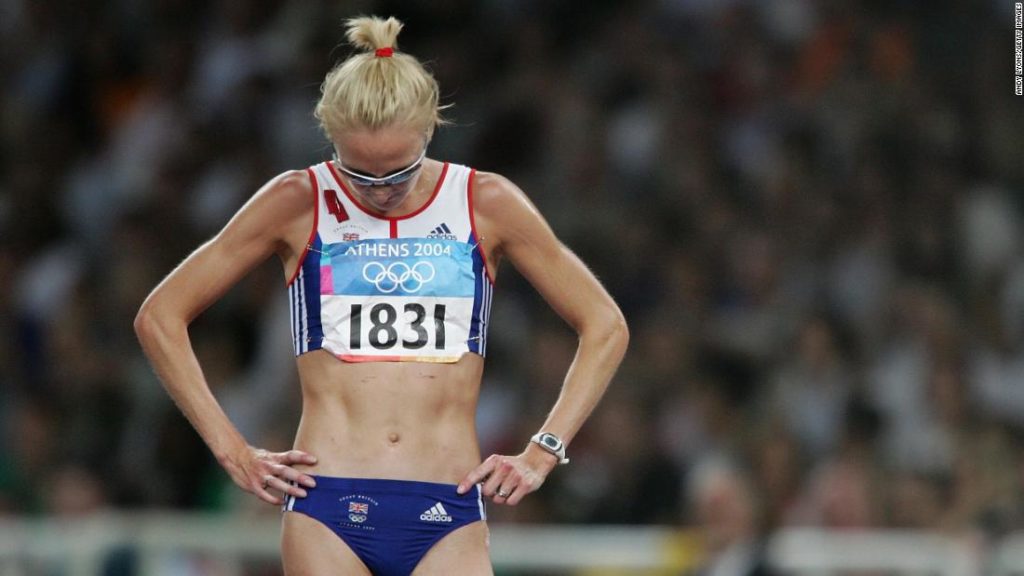And then it all went wrong. A combination of a leg injury and stomach illness meant Radcliffe was forced to pull out of the race a few miles before the finish line, disoriented and in visible distress.
Biles, the most decorated gymnast in history, pulled out over mental health concerns and Radcliffe said that while their health issues were different, the underlying problem was the same.
“Neither one of us quit. Our bodies just weren’t able to do it,” Radcliffe told CNN in a phone interview. “Very few people actually understand the relationship between your mind and your body … particularly in something that’s really physically, or mentally — or both — taxing, you really need to know when to push through it and when to listen to your body, and it’s what has made her the great champion that she is,” she said.
“I would argue that she’s actually even stronger mentally for being able to make that call now,” Radcliffe said of Biles.
The British press hounded Radcliffe relentlessly in the aftermath of the Athens Olympics, scrutinizing her every move. Reporters were hiding in bushes to watch her train and tried to trick her doctor into disclosing her private medical records. It got so bad that she and her husband and coach Gary Lough eventually left the country and went to Arizona to focus on training.
For Biles and her generation of elite athletes, however, escaping is nearly impossible because of social media.
“It can be so cruel and so heartless and harmful and particularly in this current situation where the athletes are kind of in a bubble, removed from the real world … then they start to think those comments are real and they hurt a lot more than if you were protected by all of your family and friends around you,” Radcliffe said, referring to an Olympics held during the Covid-19 pandemic.
She also suggested that tougher regulations on social media should be put into place. “You couldn’t print something in a newspaper or online that people get away with putting there and yet the people that it hurts still see it.”
A major shift on mental health, finally
Yet there is some hope for things changing. Biles’ announcement came just a month after tennis star Naomi Osaka withdrew from the French Open citing mental health reasons.
While Osaka and Biles faced some criticism — mostly from people described by Radcliffe as “armchair warriors” — both were also praised for speaking up.
The outpouring of support Biles received from everyone starting from her teammates and fellow athletes to the US Olympic Committee, commentators and fans showed that the conversation about mental health in elite sports is long overdue.
“It’s something that really needs to be properly understood,” Radcliffe said. “It took a long time to understand physical training, then it took a long time to understand proper nutrition and the psychological components to sports preparation, and how that can make you stronger, but now I think the mental health, it’s huge and it needs to be properly understood.”
Athletes for Hope — a non-profit focused on helping athletes that was founded in 2007 by a group of elite sportsmen and women including Muhammad Ali, Andre Agassi and Tony Hawk — has praised Osaka for igniting “necessary conversations about athlete mental health” and said the world was seeing an important shift in how mental health was discussed.
A statement from the US Olympic and Paralympic Committee signaled this shift. The committee said it applauded Biles’ decision to “prioritize your mental wellness over all else.”
“I think that makes it even more admirable that she’s been able to recognize that for her health she has to step back, and I think it’s helped other athletes who have been speaking up about it because, before that, there was more of a perception that people just didn’t talk about it, they just got on with it,” Radcliffe said.
Radcliffe was able to bounce back following her Athens heartbreak. She said the turning point came on a run she went on after reading one particularly hurtful article, calling her a quitter and gold digger, claiming she only raced for money.
“I headed out for a run and I couldn’t do it and I sat down on a log on the trail, sobbing. And then I just had a moment of realization which was just, ‘This is stupid. This is what I love doing, it’s been taken away from me by what other people think and they’re not even correct,'” she said.
She went on to win the New York marathon later that year. The following year, she set a new all-women marathon world record and then won a gold medal at the World Championships.
You may also like
-
Super League: UEFA forced to drop disciplinary proceedings against remaining clubs
-
Simone Biles says she ‘should have quit way before Tokyo’
-
Kyrie Irving: NBA star the latest to withhold vaccination status
-
Roger Hunt: English football mourns death of Liverpool striker and World Cup winner
-
‘Every single time I lift the bar, I’m just lifting my country up’: Shiva Karout’s quest for powerlifting glory

